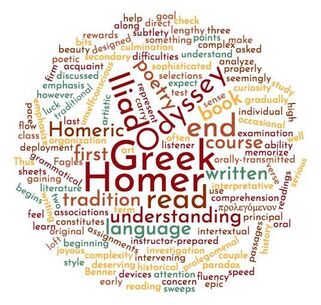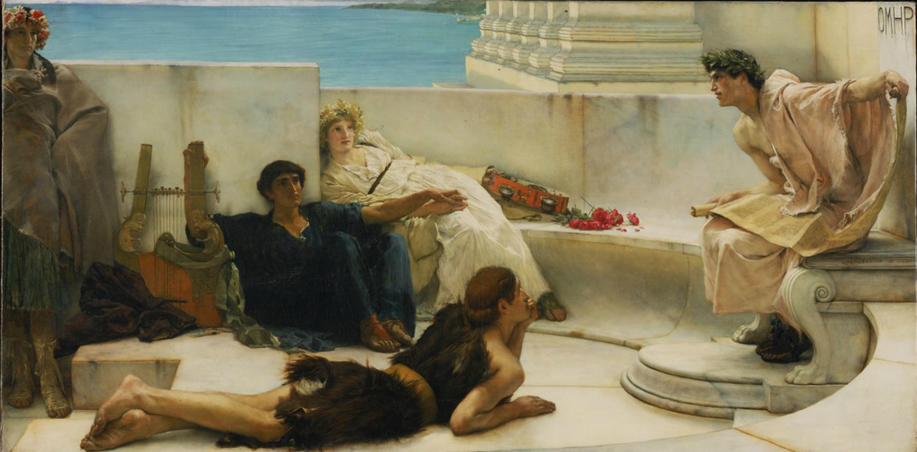Greek 204/324 | HomerSyllabus |
Homer: Iliad (and some Odyssey)
The history of Greek poetic writing begins properly with the Iliad and Odyssey, which represent however not only the beginning of the written tradition of Greek poetry but also the culmination of a lengthy tradition of orally-transmitted verse. Thus Homeric poetry constitutes something of a paradox: on the one hand, direct, traditional, and seemingly unselfconscious; on the other hand, complex in intertextual associations, sophisticated in organization and deployment of artistic devices. No historical curiosity this, but high art deserving of our most serious attention.
The principal goal of our course will be to learn how to read the works of Homer in the original language. All students will read substantial selections from the Iliad; the 324 class will have the pleasure of also reading from the Odyssey. We will also take time to explore interesting aspects of Homeric scholarship; visit with Homeric papyri in the Rubenstein; and the 324 class may also look into some contemporary reception to the poem.
The course will emphasize understanding of the Greek in all its subtlety, complexity, and beauty. But we will also concern ourselves with gaining some fluency in our reading of Homeric Greek. To that end, we will gradually speed up the pace of the readings, at first through the use of instructor-prepared help sheets. By the end of the term we expect to have a firm feel for the flow of the epic language, that joyous sense of the “loft and carry that sweeps along the listener” (Fagles). We will read in Greek all of the first book of the Iliad, the end of the last book, and some of the intervening selections from Benner as well. The Greek 324 class will also read one or more books from the Odyssey.
The course will emphasize understanding of the Greek in all its subtlety, complexity, and beauty. But we will also concern ourselves with gaining some fluency in our reading of Homeric Greek. To that end, we will gradually speed up the pace of the readings, at first through the use of instructor-prepared help sheets. By the end of the term we expect to have a firm feel for the flow of the epic language, that joyous sense of the “loft and carry that sweeps along the listener” (Fagles). We will read in Greek all of the first book of the Iliad, the end of the last book, and some of the intervening selections from Benner as well. The Greek 324 class will also read one or more books from the Odyssey.
Course requirements
There will be occasional, often individual, written and oral assignments on secondary literature, and early on one or two quizzes. The quizzes will be designed to check understanding of grammatical points and to acquaint you with my style of examination. There will be three one-hour examinations. Examinations will test your ability to understand and analyze passages read and discussed in class, with emphasis on comprehension of the Greek. You will also be asked to memorize a couple of bits of Homer.
Students are expected to come to every class; each student's daily contribution is an essential component of our learning and your grade. Of course you will be spending time outside of class preparing, but the day to day exercises and other training in the supportive environs of the classroom are essential. If you are finding the work easy, that's great, and that means you need to be in class to help your fellow students.
The Duke Academic Integrity Policy of course applies in every particular: see http://trinity.duke.edu/academic-requirements?p=academic-integrity
Students are expected to come to every class; each student's daily contribution is an essential component of our learning and your grade. Of course you will be spending time outside of class preparing, but the day to day exercises and other training in the supportive environs of the classroom are essential. If you are finding the work easy, that's great, and that means you need to be in class to help your fellow students.
The Duke Academic Integrity Policy of course applies in every particular: see http://trinity.duke.edu/academic-requirements?p=academic-integrity
Assessment
Graded work will be weighted as follows:
- Presentations, short papers, class work - 34%
- Three one-hour examinations - 66% (3 x 22%)
Books
Textbooks
Required in print for all students:
Allen Rogers Benner, Selections from Homer’s Iliad. 1903, reprinted many times.
324 students only, required:
Beth Severy. Odyssey I, VI, IX (Bryn Mawr Commentaries, Greek). 1991.
T. W. Allen. Homeri Opera. Vol. 3. Odyssea. Oxford Classical Texts. (Can also be accessed online via the Thesaurus Linguae Graecae.
Online:
R. J. Cunliffe. Lexicon of the Homeric Dialect. Univ. of Oklahoma Press, 1980. Benner contains a useful short vocabulary, but Cunliffe is essential for exploring Homeric vocabulary in detail. Cunliffe is free on-line through the Thesaurus Linguae Graecae. Autenreith’s lexicon, not as good, is also available on-line and with an iOS app via Logeion.
Allen Rogers Benner, Selections from Homer’s Iliad. 1903, reprinted many times.
324 students only, required:
Beth Severy. Odyssey I, VI, IX (Bryn Mawr Commentaries, Greek). 1991.
T. W. Allen. Homeri Opera. Vol. 3. Odyssea. Oxford Classical Texts. (Can also be accessed online via the Thesaurus Linguae Graecae.
Online:
R. J. Cunliffe. Lexicon of the Homeric Dialect. Univ. of Oklahoma Press, 1980. Benner contains a useful short vocabulary, but Cunliffe is essential for exploring Homeric vocabulary in detail. Cunliffe is free on-line through the Thesaurus Linguae Graecae. Autenreith’s lexicon, not as good, is also available on-line and with an iOS app via Logeion.
Companion Texts (on reserve or online)
- Mark W. Edwards, Homer, Poet of the Iliad. Johns Hopkins, 1987. Still in many respects the best introduction to the Iliad and the scholarship about it. On reserve in the Classics library
- W. B. Owen and E. J. Goodspeed. Homeric Vocabularies. Univ. of Oklahoma Press, 1979. Electronic resource: see library catalogue. Word lists organized by frequency.
- I. Morris and B. Powell, ed. A new companion to Homer. Brill, 1997. On reserve in the Classics library
- Robert Fowler, ed. The Cambridge Companion to Homer. Cambridge University Press, 2004. Available online through library catalogue.
- G. S. Kirk et al. The Iliad, a commentary. Cambridge (in six volumes, 1985-93). The standard large-scale commentary on the Iliad. Each volume starts with a set of essays on general topics, the collection of which forms an outstanding introduction to the Iliad. On reserve in the Classics library.
Any of you who has not read the Iliad in translation should. At once. I recommend these, readily available in bookstores and in the library:
- Caroline Alexander. The Iliad: Homer. The newest translation, very fine and poetic, and the only translation into English by a woman (!).
- R. Fagles, Homer: the Iliad (translation). Very readable; a fine if loose poetic translation that has been my standard choice for courses in translation. Powell’s new translation also has its merits in terms of readability for undergraduate audiences.
- R. Lattimore, The Iliad of Homer (translation). Less immediately accessible, but highly poetic and masterfully close to the Greek.
Greek 324 students will find these Odyssey commentaries on reserve:
- A. Heubeck et al. A Commentary on Homer's Odyssey. Oxford (in three volumes, 1988- ). The standard anglophone large-scale commentary on the Odyssey.
- W. B. Stanford. Odyssey: Books 1-XII. MacMillan, 1937. Long the standard advanced "school" commentary.
- A. F. Garvie, Homer: Odyssey Books VI-VIII. Cambridge 1994. In the Green & Yellow series, an updated advanced "school" commentary for Book 6.
Greek 324 students will want to read the Odyssey if they have not already. Here are some Odyssey recommendations:
- Emily Wilson. The Odyssey: Homer. A celebrated new-ish translation, and the first translation into English of either epic by a woman; Wilson is working on a translation of the Iliad now.
- R. Fagles, Homer: the Odyssey (translation). Very readable; just as with the Iliad a fine if loose poetic translation that has been my standard choice for courses in translation.
- R. Fitzgerald, The Iliad of Homer (translation). Less immediately accessible because of the older language, but highly poetic.
Instructor
|
Vertical Divider
|
William A. Johnson, Professor and Chair, Classical Studies
Allen Building 229B, [email protected] Office hours Tu 3:00-4:30, by chance, or by appointment - if my door is open, feel free to knock and come in. Post Spring Break, find the professor in his virtual office at https://duke.zoom.us/my/w.johnson on Tuesdays at 3:00, or write to schedule a F2F Zoom meeting |
The painting at top is a detail of hoplites running, from a black-figure vase, 6th c. BCE, currently in the Museo Archeologico Nazionale, Naples. The painting inset is by Sir Lawrence Alma-Tadema, A Reading from Homer, 1885, in the Philadelphia Museum of Art.

